

0vW3uxH.png (650×500) The Wim Hof Method *Revealed* - How to Consciously Control Your Immune System. We previously published an article about Wim Hof, holder of 20 Guinness World Records for withstanding extreme temperatures.

He has climbed Everest and Kilimanjaro in only shorts and shoes, stayed comfortably in ice baths for hours, and run a full marathon in the highest desert (50 degrees celsius, 122 Fahrenheit) with no water & food. Wim is able to accomplish these feats with ease through the use of ‘The Wim Hof Method‘ — a breathing technique that allows you to control the autonomous systems of the body. However the most earthshaking effect of the Wim Hof Method is the ability to consciously control the immune system to fight off diseases. Our immune system plays a significant role in almost all devastating diseases plaguing the modern world, and finding a way to improve it can help us discover new avenues for medicine.
STAN LEE SUPERHUMANS - SUPERSIGHT. The Wim Hof Method *Revealed* – How to Consciously Control Your Immune System. How to sit Zen (and stretching excercises for the full lotus) Meditation Helps At-Risk Teens Stay Healthy. By Arshdeep SaraoEpoch Times Staff Created: June 11, 2012 Last Updated: June 21, 2012 Regular meditation could decrease the risk of developing cardiovascular disease in teens who are most at risk.
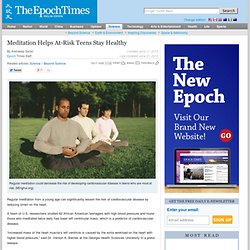
(Minghui.org) Regular meditation from a young age can significantly lessen the risk of cardiovascular disease by reducing strain on the heart. A team of U.S. researchers studied 62 African American teenagers with high blood pressure and found those who meditated twice daily had lower left ventricular mass, which is a predictor of cardiovascular disease. “Increased mass of the heart muscle’s left ventricle is caused by the extra workload on the heart with higher blood pressure,” said Dr.
Harvard Gazette: Meditation changes temperatures. Mind controls body in extreme experiments By William J.
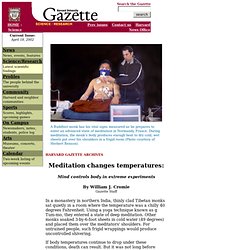
How to Master the Lotus Position (Padmasana) Lucidology 101 - How To Trick Your Body Into Falling Asleep. Bankei Yotaku, Zen Master of the “Unborn” Compiled from various sources [1] (see endnotes) by Timothy Conway (1992).
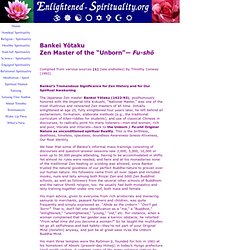
Bankei’s Tremendous Significance for Zen History and for Our Spiritual Awakening The Japanese Zen master Bankei Yōtaku (1622-93), posthumously honored with the Imperial title Kokushi, “National Master,” was one of the most illustrious and renowned Zen masters of all time. Initially enlightened at age 25, fully enlightened four years later, he left behind all sectarianism, formalism, elaborate methods (e.g., the traditional curriculum of kōan-riddles for students), and use of classical Chinese in discourses, to radically point his many listeners—men and women, rich and poor, literate and illiterate—back to the Unborn / Fu-shō Original Nature as unconditioned spiritual Reality.
K7URW.jpg 500×437 pixels. Kristin Neff: The Chemicals of Care: How Self-Compassion Manifests in Our Bodies. In my work I have defined self-compassion as having three main interacting components: self-kindness, a sense of common humanity and mindfulness.

Self-kindness refers to the tendency to be caring and understanding with oneself rather than being harshly critical or judgmental. Instead of taking a cold "stiff-upper-lip" approach in times of suffering, self-kindness offers soothing and comfort to the self. Heal thyself: Meditate - health - 30 August 2011. Read more: "Heal thyself: The power of mind over matter" Monks have been meditating on mountaintops for millennia, hoping to gain spiritual enlightenment.

Their efforts have probably enhanced their physical health, too. Trials looking at the effects of meditation have mostly been small, but they have suggested a range of benefits. There is some evidence that meditation boosts the immune response in vaccine recipients and people with cancer, protects against a relapse in major depression, soothes skin conditions and even slows the progression of HIV. Meditation might even slow the ageing process. As with social interaction, meditation probably works largely by influencing stress response pathways. One of the co-authors of Saron's study, Elissa Epel, a psychiatrist at the University of California, San Francisco, believes that meditation may also boost "pathways of restoration and health enhancement", perhaps by triggering a release of growth and sex hormones. FLATBED SUTRA » The Five Ranks – Lesson 14 – Free Online Course: Classic Teachings of Zen Buddhism. The Five Ranks – Lesson 14 – Free Online Course: Classic Teachings of Zen Buddhism The Five Ranks – Lesson 14 – Free Online Course: Classic Teachings of Zen Buddhism [Link to Lesson 1] [Link to Lesson 2] [Link to Lesson 3] [Link to Lesson 4] [Link to Lesson 5] [Link to Lesson 6] [Link to Lesson 7] [Link to Lesson 8] [Lesson 9] [Lesson 10] [Lesson 11] [Lesson 12] [Lesson 13]
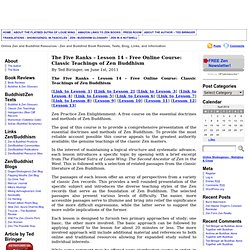
Fasting fakir flummoxes physicians. Doctors and experts are baffled by an Indian hermit who claims not to have eaten or drunk anything for several decades - but is still in perfect health.
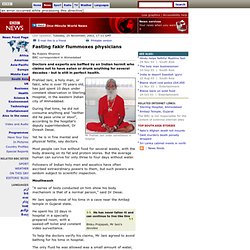
Prahlad Jani, a holy man, or fakir, who is over 70 years old, has just spent 10 days under constant observation in Sterling Hospital, in the western Indian city of Ahmedabad. During that time, he did not consume anything and "neither did he pass urine or stool", according to the hospital's deputy superintendent, Dr Dinesh Desai. Yet he is in fine mental and physical fettle, say doctors. Most people can live without food for several weeks, with the body drawing on its fat and protein stores.
Ram Bahadur Bomjon. Ram Bahadur Bomjon He drew thousands of visitors and media attention by spending months in meditation.
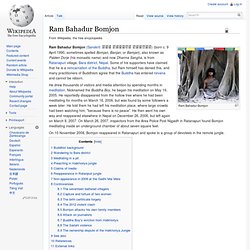
Nicknamed the Buddha Boy, he began his meditation on May 16, 2005. He reportedly disappeared from the hollow tree where he had been meditating for months on March 16, 2006, but was found by some followers a week later. He told them he had left his meditation place, where large crowds had been watching him, "because there is no peace". He then went his own way and reappeared elsewhere in Nepal on December 26, 2006, but left again on March 8, 2007. u6qvC.png 840×475 pixels. Bukkyo Dendo Kyokai (BDK) –- Digital Texts. "Mutually Sustaining Life” and “The Buddhist Way of Life" a 2-year long, weekly Buddhist broadcast on TV featuring American Buddhist teachers and laypeople.

Click here to connect to Dharmanet.org Digital Texts We are pleased to make available the fruits of the BDK Tripitaka Translation Series in freely distributable PDF format. As more files are prepared for distribution, they will be added to the list here. Please check back periodically! The files presented here are word-for-word duplicates of our printed volumes. The appropriate format for citing these files in online or print publications includes the URL and date of access following the usual bibliographic data.
Brain imaging illustrates how meditation reduces pain. Public release date: 5-Apr-2011 [ Print | E-mail Share ] [ Close Window ] Contact: Marguerite Beckmarbeck@wakehealth.edu 336-716-2415Wake Forest Baptist Medical Center WINSTON-SALEM, N.C. – April 5, 2011 – Meditation produces powerful pain-relieving effects in the brain, according to new research published in the April 6 edition of the Journal of Neuroscience. "This is the first study to show that only a little over an hour of meditation training can dramatically reduce both the experience of pain and pain-related brain activation," said Fadel Zeidan, Ph.D., lead author of the study and post-doctoral research fellow at Wake Forest Baptist Medical Center.
"We found a big effect – about a 40 percent reduction in pain intensity and a 57 percent reduction in pain unpleasantness. For the study, 15 healthy volunteers who had never meditated attended four, 20-minute classes to learn a meditation technique known as focused attention. Scientific Papers on Meditation. At End-Of-The Line Prison, An Unlikely Escape. Hide captionJohnny Mack Young, Lawrence Parker and Frederick Jackson attend graduation ceremonies at William E. Donaldson prison in Bessemer, Ala., after completing Vipassana meditation classes. The courses are held four times a year in the prison gymnasium. Dave Martin/AP. Mindfulness meditation training changes brain structure in 8 weeks. (PhysOrg.com) -- Participating in an 8-week mindfulness meditation program appears to make measurable changes in brain regions associated with memory, sense of self, empathy and stress.
In a study that will appear in the January 30 issue of Psychiatry Research: Neuroimaging, a team led by Massachusetts General Hospital (MGH) researchers report the results of their study, the first to document meditation-produced changes over time in the brain's grey matter. "Although the practice of meditation is associated with a sense of peacefulness and physical relaxation, practitioners have long claimed that meditation also provides cognitive and psychological benefits that persist throughout the day," says Sara Lazar, PhD, of the MGH Psychiatric Neuroimaging Research Program, the study's senior author. Wray Herbert: New Meditation Research: Putting the 'Om' in 'Chromosome' The Shambhala Mountain Center sits nestled among the remote lakes and pastures of Colorado's Rocky Mountains, where for four decades it has offered instruction and retreat to serious students of meditation and yoga.
Starting in February 2007, it became a scientific laboratory as well. The Advaita Trap - The Cartoon. Positive well-being to higher telomerase: Psychological changes from meditation training linked to cellular health. Positive psychological changes that occur during meditation training are associated with greater telomerase activity, according to researchers at the University of California, Davis, and the University of California, San Francisco. The study is the first to link positive well-being to higher telomerase, an enzyme important for the long-term health of cells in the body.
The effect appears to be attributable to psychological changes that increase a person's ability to cope with stress and maintain feelings of well-being. "We have found that meditation promotes positive psychological changes, and that meditators showing the greatest improvement on various psychological measures had the highest levels of telomerase," said Clifford Saron, associate research scientist at the UC Davis Center for Mind and Brain. Meditation. From Zen to Zeno: How I Became a Stoic. This is the first in a series of three essays, written by a Stoic, about what it means to practice an ancient philosophy in the modern world.
(Read the second essay.) Kaihōgyō. Say Om: Doctors Find Meditation Affects Your Body. The heart of Buddhist meditation ... Patikulamanasikara. Translation[edit]